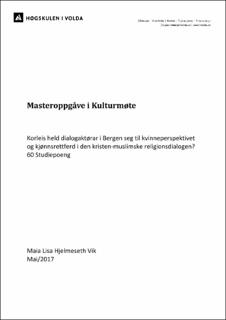| dc.contributor.author | Vik, Maia Lisa Hjelmeseth | |
| dc.coverage.spatial | Bergen, Hordaland, Norway | nb_NO |
| dc.date.accessioned | 2017-06-16T12:53:06Z | |
| dc.date.available | 2017-06-16T12:53:06Z | |
| dc.date.issued | 2017 | |
| dc.identifier.uri | http://hdl.handle.net/11250/2446295 | |
| dc.description.abstract | Summary
This thesis explores how different dialogue-activists in the second largest city of Norway, Bergen, deals with women´s perspective and gender justice in the Christian-Muslim religious dialogue. The idea behind this examination came from the fact that there is an increased focus on religion, culture and gender in the public conversation, and especially that the focus is on Islam and Muslim groups. This made me wonder what is being done at the grassroot level to work with enhanced understanding of people with different religious backgrounds, when it comes to the woman´s perspective. Dialogue activities in Bergen are little presented in research contexts, and in Norway there is only theologian and priest Anne Hege Grung who has made theories and research on how one can include a gender perspective in the dialogue. Her theories, amongst other theories, will be presented in this thesis, and used in the analysis of the material. This study is a qualitative study, using informants involved in inter-religious dialogue activities in Bergen. The material has been collected through semi structured lifeworld interviews with nine informants. Two of the informants work in dialogue-oriented organizations in Bergen, two are Christians, and five are Muslims. One of the most important findings in this survey is that there were different needs among the informants when it came to addressing the women´s perspective in the dialogue. While the Christian informants did not see it as urgent to raise the women´s perspective in the dialogue, the Muslim informants wanted the women´s perspective to be more prominent in the dialogue. In my analysis, I found that one of the reasons for the great interest in promoting the women´s perspective among my Muslim informants, was a need to respond to the public conversation, that they felt were focusing negatively on Muslims, Muslim women and the gender roles in Islam. Some of the Muslim informants expressed that they did not feel heard or met in the public conversation, while the religious dialogue seemed to be a more appropriate channel for them to reach out. On the other hand, the Christian informants expressed that there were other, just as important issues as the women´s perspective to deal with in the dialogue. It may therefore seem that there are different needs among the Christian and Muslim dialogue-activists in Bergen when it comes to dealing with women´s perspective in the dialogue. | en |
| dc.description.abstract | Samandrag
Denne masteroppgåva undersøker korleis ulike dialogaktørar i Bergen held seg til kvinneperspektivet og kjønnsrettferd i den kristen-muslimske religionsdialogen. Ideen bak undersøkinga, kom av at det er eit auka fokus på religion, kultur og kjønn i den offentlege samtalen, og at fokuset særleg har vore på islam og muslimske miljø. Dette fekk meg til å undrast på kva som vert gjort på grasrotnivå for å arbeide med auka forståing mellom menneske med ulik religiøs bakgrunn, særleg når det kjem til kvinneperspektivet. Dialog-aktivitetar i Bergen er lite presentert i forskingssamanheng, og her i Noreg er det berre teologen og presten Anne Hege Grung som har konkretisert teoriar og forska på korleis ein kan inkludere eit kjønnsperspektiv i religionsdialogen. Hennar teoriar, med andre teoriar, vil verte presentert i denne masteroppgåva, og brukt i analysen av materialet. Denne undersøkinga er eit kvalitativt studie, med bruk av informantar som er knytt til religionsdialog-aktivitetar i Bergen. Materialet har vorte innhenta gjennom semistrukturerte livsverdsintervju med ni informantar. Av desse er to informantar knytt til dialogorienterte organisasjonar i Bergen, to er kristne, og fem er muslimske. Eit av dei viktigaste funna i denne undersøkinga, er at det var ulike behov blant informantane når det kom til å ta opp kvinneperspektivet i dialogen. Medan dei kristne informantane ikkje såg det som prekært å løfte fram kvinneperspektivet i dialogen, ønska dei muslimske informantane at kvinneperspektivet skulle verte løfta meir fram i dialogen. I mi analyse har eg funne ut at ein av årsakene til den store interessa for å løfte fram kvinneperspektivet blant dei muslimske informantane, var eit behov for å respondere på den offentlege samtalen si negative framstilling av muslimar, muslimske kvinner og kvinnesynet i islam. Dei muslimske informantane uttrykte at dei ikkje kjente seg høyrt eller møtt i den offentlege samtalen, medan religionsdialogen verka til å vere ein betre kanal for dei å nå ut på. Dei kristne informantane uttrykte på si side at det var andre, like viktige saker som kvinneperspektivet, å problematisere i dialogen. Det kan difor verke som at det er ulike behov blant kristne og muslimar når det kjem til å tematisere kjønn i dialogen. | nn_NO |
| dc.language.iso | nno | |
| dc.publisher | Høgskulen i Volda | nn_NO |
| dc.title | Korleis held dialogaktørar i Bergen seg til kvinneperspektivet og kjønnsrettferd i den kristen-muslimske religionsdialogen? | nn_NO |
| dc.title.alternative | Hvordan forholder ulike religionsdialog-aktører i Bergen seg til temaet kjønnsrettferdighet? | nb_NO |
| dc.type | Master thesis | nb_NO |
| dc.subject.nsi | VDP::Humanities: 000::Theology and religious science: 150 | en |
| dc.subject.nsi | VDP::Social science: 200::Sociology: 220 | en |
| dc.source.pagenumber | 119 | nb_NO |
| dc.relation.project | NSD 49653 | |
